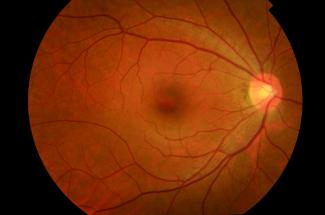
• The teaching case, written by the Singapore Management University, documents the story of SELENA+, and is available on Harvard Business Publishing and The Case Centre
• SELENA+ is the brainchild of clinicians and researchers at Singapore National Eye Centre, Singapore Eye Research Institute and the National University of Singapore’s School of Computing.
Singapore, 29 November 2023 – Singapore offers a new business teaching case about how a locally-developed eye screening artificial intelligence (AI) system SELENA+ (Singapore Eye LEsioN Analyzer Plus) became commercialised. Written by a Singapore Management University (SMU) team led by Professor Emeritus of Information Systems Steven Miller, the case is being distributed by two world-renowned distribution portals for management-oriented teaching cases – Harvard Business Publishing and The Case Centre. An innovation and entrepreneurship case study on an AI-based healthcare tool from Singapore, it is available to business and management students worldwide.
The development of SELENA+ can be traced back to development and testing efforts that started 20 years ago. As diabetes became increasingly prevalent in the local population, there was a need to address the problem of accurately detecting diabetes-related eye diseases like diabetic retinopathy, which could lead to blindness if left undiagnosed.
To identify patients at risk of diabetic eye diseases, screenings had to be conducted on a large scale, and patients had to undergo such screenings regularly. There were also various challenges in diagnosing diabetic eye conditions in primary care settings, where retinal images were manually screened and could take two to four weeks to be assessed, causing significant time-lag.
SELENA+, the brainchild of clinicians and researchers at Singapore National Eye Centre (SNEC) and Singapore Eye Research Institute (SERI), with key contributions from two faculty members of the School of Computing of National University of Singapore (NUS), was developed as an image-based, pattern recognition software, to accurately analyse retinal images to detect diabetic retinopathy, and eventually other major diabetes-related eye diseases like glaucoma and age-related macular degeneration.
As SELENA+ saw great success in its objective, the developers moved ahead to commercialise the innovation through a start-up called EyRIS. The teaching case on EyRIS’ AI-driven SELENA+ illustrates the journey of SELENA+ from inception to commercialisation, and the entrepreneurial challenges that its stakeholders encountered along the way.
The case study enables educators and students to better address the challenges around innovation and entrepreneurship, such as innovation management, pivoting, scaling a business, and the need to tweak or overhaul business models based on different geographical contexts.
“It was a privilege to work with SMU and Professor Emeritus Steven Miller to create this teaching case, and we are honoured that it is being distributed by Harvard Business Publishing and The Case Centre. The SELENA+ story has spanned so many years and is certainly one that is close to my heart. I hope that through this case study, students from all around the world can explore and appreciate our journey in healthcare AI through an entrepreneurship lens,” said Professor Wong Tien Yin, Lead Principal Investigator of SELENA+ and Co-Founder of EyRIS. Prof Wong is also Senior Advisor to SingHealth and Singapore National Eye Centre (SNEC) and Senior Principal Clinician Scientist (Adjunct) with Singapore Eye Research Institute (SERI).
It was during an exploratory discussion with SNEC, that Professor Emeritus Miller and David Gomulya, Associate Professor of Strategy & Entrepreneurship, and Academic Director of the Master of Entrepreneurship and Innovation programme at SMU’s Lee Kong Chian Business School, recognised the immense teaching value in a case study that centres on this Singapore-developed eye-screening solution.
Professor Emeritus Miller summarises how this success story developed over two decades. “It started with a small team of medical scientists and clinicians at SNEC and SERI working with a few computer scientists at NUS. Because of the Ministry of Health’s support for the Singapore Integrated Diabetic Retinopathy programme, the high-quality data needed to train the AI system materialised. The steps they had to take from the research and development stage to pilot testing, continuing further with the EyRIS’ commercialisation efforts that made it possible to obtain necessary regulatory approvals, all crystallised in the creation of a robust product. Then, marketing the product beyond Singapore opened a new chapter of the story, which is ongoing. This case study will be a great asset for anyone interested in combining research and development, clinical process innovation, entrepreneurship, and commercialisation in the healthcare sector,” he said.
Useful Links:
The Case Centre:
Case: https://www.thecasecentre.org/products/view?id=193780
Teaching Note: https://www.thecasecentre.org/products/view?id=193781
Harvard:
Case: https://hbsp.harvard.edu/product/054SMU-PDF-ENG?Ntt=eyris
Teaching Note: https://hbsp.harvard.edu/product/055SMU-PDF-ENG?Ntt=eyris